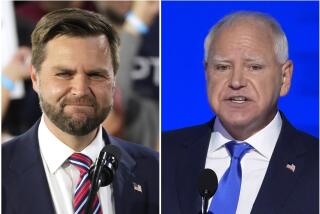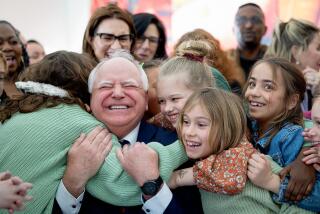Long and short of VP lists
WASHINGTON — Never in modern memory have so many eminent people been mentioned for a job that has been compared -- unfavorably -- to a bucket of warm spit.
To believe the talk in Washington, Sen. Barack Obama (D-Ill.) is considering more than two dozen candidates as potential vice presidential nominees, including 13 senators or former senators, 11 governors or former governors, two retired generals and former Vice President Al Gore.
For Sen. John McCain (R-Ariz.), the list of potential running mates is almost as long: eight current or former senators, 10 current or former governors, a couple of high-technology chief executives -- and one of the same retired generals Obama likes.
“This list is getting so long that everyone’s going to end up on it eventually,” joked Sen. Richard J. Durbin (D-Ill.), who has advised Obama on whom to pick.
Everyone except Durbin. Since he comes from the same state as his party’s nominee, he won’t get the job. So he’s declared himself chairman of the “Ineligible Caucus.”
But those are just the “long lists,” roll calls that include not only real possibilities but anyone the presumptive nominees want to flatter with a mention.
The real question is who’s on the “short lists.” And that remains, for the moment, Washington’s deepest mystery.
Both candidates have refused to say who’s on their short lists, whether they even have short lists, or when they plan to choose.
“At this point, you want a long list so you can talk to everyone you should,” Durbin said.
The candidates’ staffs are tight-lipped as well. The McCain campaign won’t even say who is running their vice presidential selection process. (It’s A.B. Culvahouse, chairman of the law firm O’Melveny & Myers and a White House counsel under President Reagan.) But if most of those directly involved are keeping quiet, that doesn’t stop political professionals from gossiping. Based on their educated guesses, this is how the winnowing is likely to proceed:
McCain is tempted to choose his friend Sen. Joe Lieberman of Connecticut, a Democrat-turned-independent who has campaigned for the presumed Republican nominee. But he’s more likely to go with Minnesota Gov. Tim Pawlenty, former Massachusetts Gov. Mitt Romney or Sen. John Thune of South Dakota, actual Republicans, who would be more palatable to the party’s conservative core.
Obama is reported to be considering Sen. Jim Webb of Virginia and former Sen. Sam Nunn of Georgia, two Democrats with formidable national security credentials, but he’s more likely to settle on Sen. Joseph R. Biden Jr. of Delaware or Sen. Evan Bayh of Indiana.
Sen. Hillary Rodham Clinton of New York, who battled Obama for the nomination, is not likely to be chosen, Democratic strategists have concluded -- if only because her husband, former President Clinton, has conspicuously failed to make peace with the man who defeated his wife.
To go with such analyses, here are some facts:
Geography is not as important as it used to be. The last vice presidential candidate chosen mainly to deliver a state’s electoral votes was Lyndon B. Johnson of Texas, and that campaign was in 1960, a year before Obama was born.
Instead, each of the current campaigns is probably asking four questions, strategists from both parties said.
First, does the candidate bring balance to the ticket -- not geographical balance but resume balance? McCain probably wants someone who can shore up his standing among social conservatives, the Republican “base” that provides millions of volunteers and voters but has been relatively unenthusiastic about him. Obama may be looking for someone with deeper national security experience than a first-term senator who didn’t serve in the military.
Second, credibility: “Is this someone who could, in an emergency, step in and lead the nation?” Durbin asked. That question is as important for Obama, 46, as it is for McCain, 71.
Third, compatibility: Can these two politicians forge a good working partnership that will make their campaign more effective? And in an era when the vice presidency has become more powerful than ever before, could they work well together in the White House?
“What both Sen. Obama and Sen. McCain will be looking for is someone who will be a partner in governing,” said Ron Klain, who helped Democratic nominee Al Gore choose Lieberman as his running mate in 2000.
“Outside observers assume it’s a more political decision than it is.”
Finally, there’s the “do no harm” rule: Will the vice presidential nominee turn out to be a problem instead of an asset? In 1972, Democratic vice presidential nominee Thomas F. Eagleton withdrew from the race after a newspaper discovered that he had received psychiatric care, including electric shock treatments.
Ever since, presidential campaigns have mounted massive fact-finding efforts to ensure that potential picks are hiding no skeletons.
Some of the names on the candidates’ long lists are there merely to please different constituencies.
People are flattered to be mentioned.
And every state likes hearing that one of its own is on the list. That’s why almost every living politician from a swing state like Ohio gets cited -- but few Californians or New Yorkers.
Other names are there to provide demographic balance; each campaign wants to show that it’s considering women and ethnic minorities, even if they don’t get picked in the end, strategists said.
--
--
Begin text of infobox
In the running to be running mates
DEMOCRATS
Evan Bayh
People around Obama have confirmed that he is under consideration. The Indiana senator, a moderate, was a prominent Hillary Rodham Clinton supporter, so his choice would be another step toward party unity. “There’s a lot to recommend him,” said one Democratic strategist. “He’s safe.”
--
Joseph R. Biden Jr.
The chairman of the Senate Foreign Relations Committee has worked closely with Obama on Iraq and other issues. He would help close the nominee’s “experience deficit” on national security, but he’s publicly criticized Obama’s willingness to meet with leaders of Iraq and North Korea. And he comes from Delaware, one of the smallest states in the nation.
--
Hillary Rodham Clinton
She’s supported by millions of Democratic voters, has pledged to campaign for the ticket, and Sen. Dianne Feinstein (D-Calif.) is still urging Obama to choose her. But Obama aides sound distinctly cool to the idea.
--
Sam Nunn
The former senator, 69, a defense expert, has advised Obama on nuclear issues and could help carry his native Georgia and other states in the South. But he’s been retired from electoral politics for more than a decade, and many gay Democrats oppose him because he helped block President Clinton’s proposal in 1993 to allow gays to serve openly in the military.
--
Jim Webb
Obama likes the outspoken senator from Virginia, a Marine Corps veteran who was secretary of the Navy under President Reagan. But he may be too outspoken. “The admirable thing about Jim Webb is that he always speaks his mind -- but that may not be what you want in a vice president,” one Democratic strategist said.
--
Other officials Obama may be considering: Sens. Christopher J. Dodd (D-Conn.), Chuck Hagel (R-Neb.), Claire McCaskill (D-Mo.), Bill Nelson (D-Fla.) and Ken Salazar (D-Colo.); former Sens. Tom Daschle (D-S.D.), John Edwards (D-N.C.) and Bob Graham (D-Fla.); Govs. Phil Bredesen (D-Tenn.), Tim Kaine (D-Va.), Janet Napolitano (D-Ariz.), Edward G. Rendell (D-Pa.), Bill Richardson (D-N.M.), Bill Ritter Jr. (D-Colo.), Brian Schweitzer (D-Mont.), Kathleen Sebelius (D-Kan.) and Ted Strickland (D-Ohio); former Govs. Tom Vilsack (D-Iowa) and Mark Warner (D-Va.); Rep. Chet Edwards (D-Texas); former Rep. Tim Roemer (D-Ind.); former Vice President Al Gore; New York Mayor Michael R. Bloomberg; retired Army Gen. Wesley K. Clark; and retired Marine Gen. James L. Jones.
----
REPUBLICANS
Charlie Crist
The Florida governor has been a powerful vote-getter in an important swing state, but some conservatives aren’t sure he’s really one of them. “The business community doesn’t like him,” said Grover Norquist, president of Americans for Tax Reform, an influential anti-tax group. “Besides, if you can’t win Florida on your own, you’re not going to win.”
--
Joe Lieberman
He’s a close friend and ally of McCain’s, but he’s not a Republican and he supports abortion rights -- so his selection would not be much of an olive branch to Republican Party stalwarts, who haven’t fallen in love with their nominee. “He’s fundamentally a liberal,” the conservative National Review said of Lieberman last week.
--
Tim Pawlenty
The Minnesota governor, an early McCain supporter, was criticized by conservatives when he imposed a “health impact fee” on cigarettes to help balance the state’s budget, but at least some have come around. “I think he’s quite good,” said Grover Norquist, president of Americans for Tax Reform, an influential anti-tax group. “He held tight on taxes when it was really tough.”
--
Mitt Romney
He came in second in the primaries, but many conservatives remain hesitant about a Mormon from Massachusetts who was once seen as relatively liberal on social issues. “A lot of social conservatives still have qualms about the religious issue; that hasn’t gone away,” said Scott Reed, who managed former Sen. Bob Dole’s 1996 presidential campaign.
--
John Thune
Another early McCain supporter, the South Dakota senator is admired by conservatives for his 2004 victory against then-Senate Majority Leader Tom Daschle. “He’s a strong conservative,” said Scott Reed, who managed former Sen. Bob Dole’s 1996 presidential campaign. “He was fully vetted when he ran against Daschle, and he showed that he’s a strong campaigner.”
--
Other officials McCain may be considering: Sens. Sam Brownback (R-Kan.), Jim DeMint (R-S.C.), Lindsey Graham (R-S.C.), Kay Bailey Hutchison (R-Texas) and Olympia J. Snowe (R-Maine); former Sen. Fred Thompson (R-Tenn.); Govs. Haley Barbour (R-Miss.), Matt Blunt (R-Mo.), Bobby Jindal (R-La.), Sarah Palin (R-Alaska) and Mark Sanford (R-S.C.); former Govs. Mike Huckabee (R-Ark.) and Tom Ridge (R-Pa.); Rep. Eric Cantor (R-Va.); former Reps. John R. Kasich (R-Ohio) and Rob Portman (R-Ohio); Secretary of State Condoleezza Rice; former New York Mayor Rudolph W. Giuliani; former Lt. Gov. Michael Steele (R-Md.); former Hewlett-Packard Co. Chief Executive Carly Fiorina; and former EBay Chief Executive Meg Whitman. McCain is also reportedly considering New York Mayor Michael R. Bloomberg and retired Marine Gen. James L. Jones, who both made Obama’s list.
More to Read
Get the L.A. Times Politics newsletter
Deeply reported insights into legislation, politics and policy from Sacramento, Washington and beyond. In your inbox three times per week.
You may occasionally receive promotional content from the Los Angeles Times.











